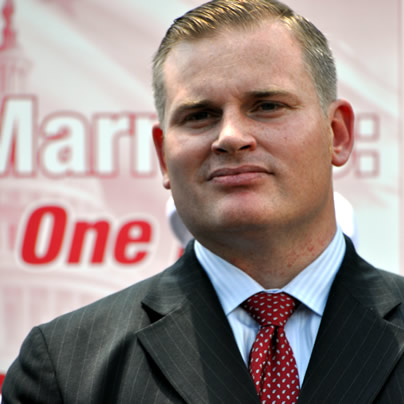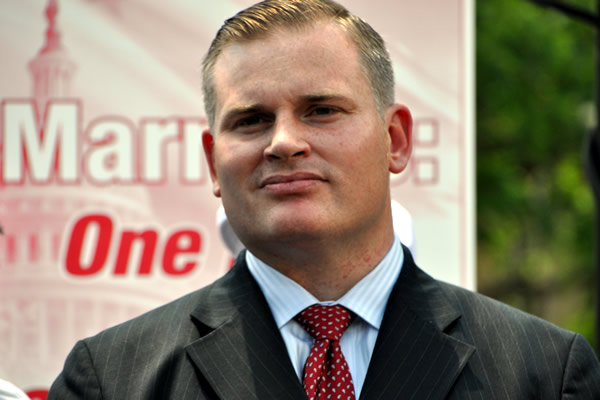National
NOM chief responds to ‘second-best option’ remarks
Brown affirms children do best with biological parents; won’t say if he shares adoption view


NOM President Brian Brown on Thursday responded to the view that adoption is the “second-best option” for children (Washington Blade file photo by Michael Key)
The president of the National Organization for Marriage on Thursday maintained children do better when raised by biological parents when asked to affirm whether he believes U.S. Supreme Court Chief Justice John Roberts’ decision to adopt children was the “second-best option” for them — a view articulated by his organization’s board chair.
“Well, the reality is that on any indicator we’ve been able to measure since the explosion and the break down of the family from the 60s to the present is that children do best with both their mother and father,” NOM President Brian Brown said. “Obviously, we need to encourage adoption, we need do everything we can to help single motherhood.”
Brown was asked the question by the Washington Blade during the question-and-answer session at a panel at the 2013 Conservative Political Action Conference in National Harbor.
While promoting the idea of children being raised by biological parents, he also said he encourages adoption.
Brown later drew a distinction between adopted children being raised by opposite-sex parents or a single parent and same-sex marriage.
“It’s entirely different when you put into the law the notion that either mothers or fathers are completely expendable,” Brown said. “And that, at it’s nature, is what same-sex marriage is all about: two moms or two dads are essentially the same as a mother and a father. That is not the case. Children have rights, too. Children have a right to have a chance to have both a mother and a father.”
The Blade’s question to Brown was whether he shares the views expressed by NOM Board Chair John Eastman in an Associated Press report that Roberts’ decision to adopt children was the “second-best option” for them as opposed to being raised by their biological parents.
After his initial response, the Blade asked Brown to clarify whether he shares the views articulated by Eastman with a “yes” or “no” answer. Brown replied, “I just answered you.”
After the question was asked, panel moderator Cleta Mitchell, a conservative activist who’s on the board of the American Conservative Union, which hosts CPAC, expressed displeasure, saying the panel was about the bullying of conservatives and not marriage.
Mitchell then asked whether the Blade has a practice of outing people who are gay and whether such practice should be considered bullying. This reported replied, “It depends on the circumstances.” Mitchell retorted, “I think that’s bullying.”
“Can we go to the next question?” Mitchell said later. “Let’s go the next question. I’m going to be the bully here.”
Mitchell was among the conservative activists who called for the gay conservative group GOProud to be expelled from CPAC.
It was banned in 2011 and hasn’t been allowed back since.
Eastman’s quote is particularly noteworthy because Roberts, who has adopted two children with his wife, is one of nine justices on the Supreme Court who will be deciding the issue of same-sex marriage as part of litigation challenging California’s Proposition 8 and the Defense of Marriage Act.
NOM, among other anti-gay groups, is urging the court to uphold the measures.
“You’re looking at what is the best course society-wide to get you the optimal result in the widest variety of cases,” Eastman was quoted as saying. “That often is not open to people in individual cases. Certainly adoption in families headed, like Chief Roberts’ family is, by a heterosexual couple, is by far the second-best option.”
As noted in a statement by the Human Rights Campaign, Eastman’s comments are in opposition to testimony during the 2010 trial for the Prop 8 case from David Blakenhorn, who was an expert witness on the Prop 8 side.
Blakenhorn, who has since come out in favor of marriage equality, admitted that certain studies show children may do better when raised by adoptive parents or biological parents.
“The studies show that adoptive parents, because of the rigorous screening process that they undertake before becoming adoptive parents, actually on some outcomes outstrip the biological parents in terms of providing protective care for their children,” Blakenhorn said.
Michael Lamb, the head of the Social and Developmental Psychology Department at the University of Cambridge, also rejected in trial testimony that adoptive parents are less capable than biological parents.
“Those studies showed that children are just as likely to be well adjusted as children who are being raised by their biological parents,” Lamb said.
Federal Government
Lambda Legal praises Biden-Harris administration’s finalized Title IX regulations
New rules to take effect Aug. 1

The Biden-Harris administration’s revised Title IX policy “protects LGBTQ+ students from discrimination and other abuse,” Lambda Legal said in a statement praising the U.S. Department of Education’s issuance of the final rule on Friday.
Slated to take effect on Aug. 1, the new regulations constitute an expansion of the 1972 Title IX civil rights law, which prohibits sex-based discrimination in education programs that receive federal funding.
Pursuant to the U.S. Supreme Court’s ruling in the landmark 2020 Bostock v. Clayton County case, the department’s revised policy clarifies that discrimination on the basis of sexual orientation and gender identity constitutes sex-based discrimination as defined under the law.
“These regulations make it crystal clear that everyone can access schools that are safe, welcoming and that respect their rights,” Education Secretary Miguel Cardona said during a call with reporters on Thursday.
While the new rule does not provide guidance on whether schools must allow transgender students to play on sports teams corresponding with their gender identity to comply with Title IX, the question is addressed in a separate rule proposed by the agency in April.
The administration’s new policy also reverses some Trump-era Title IX rules governing how schools must respond to reports of sexual harassment and sexual assault, which were widely seen as imbalanced in favor of the accused.
Jennifer Klein, the director of the White House Gender Policy Council, said during Thursday’s call that the department sought to strike a balance with respect to these issues, “reaffirming our longstanding commitment to fundamental fairness.”
“We applaud the Biden administration’s action to rescind the legally unsound, cruel, and dangerous sexual harassment and assault rule of the previous administration,” Lambda Legal Nonbinary and Transgender Rights Project Director Sasha Buchert said in the group’s statement on Friday.
“Today’s rule instead appropriately underscores that Title IX’s civil rights protections clearly cover LGBTQ+ students, as well as survivors and pregnant and parenting students across race and gender identity,” she said. “Schools must be places where students can learn and thrive free of harassment, discrimination, and other abuse.”
Michigan
Mich. Democrats spar over LGBTQ-inclusive hate crimes law
Lawmakers disagree on just what kind of statute to pass

Michigan could soon become the latest state to pass an LGBTQ-inclusive hate crime law, but the state’s Democratic lawmakers disagree on just what kind of law they should pass.
Currently, Michigan’s Ethnic Intimidation Act only offers limited protections to victims of crime motivated by their “race, color, religion, gender, or national origin.” Bills proposed by Democratic lawmakers expand the list to include “actual or perceived race, color, religion, gender, sexual orientation, gender identity or expression, ethnicity, physical or mental disability, age, national origin, or association or affiliation with any such individuals.”
Democratic Gov. Gretchen Whitmer and Attorney General Dana Nessel have both advocated for a hate crime law, but house and senate Democrats have each passed different hate crimes packages, and Nessel has blasted both as being too weak.
Under the house proposal that passed last year (House Bill 4474), a first offense would be punishable with a $2,000 fine, up to two years in prison, or both. Penalties double for a second offense, and if a gun or other dangerous weapons is involved, the maximum penalty is six years in prison and a fine of $7,500.
But that proposal stalled when it reached the senate, after far-right news outlets and Fox News reported misinformation that the bill only protected LGBTQ people and would make misgendering a trans person a crime. State Rep. Noah Arbit, the bill’s sponsor, was also made the subject of a recall effort, which ultimately failed.
Arbit submitted a new version of the bill (House Bill 5288) that added sections clarifying that misgendering a person, “intentionally or unintentionally” is not a hate crime, although the latest version (House Bill 5400) of the bill omits this language.
That bill has since stalled in a house committee, in part because the Democrats lost their house majority last November, when two Democratic representatives resigned after being elected mayors. The Democrats regained their house majority last night by winning two special elections.
Meanwhile, the senate passed a different package of hate crime bills sponsored by state Sen. Sylvia Santana (Senate Bill 600) in March that includes much lighter sentences, as well as a clause ensuring that misgendering a person is not a hate crime.
Under the senate bill, if the first offense is only a threat, it would be a misdemeanor punishable by one year in prison and up to $1,000 fine. A subsequent offense or first violent hate crime, including stalking, would be a felony that attracts double the punishment.
Multiple calls and emails from the Washington Blade to both Arbit and Santana requesting comment on the bills for this story went unanswered.
The attorney general’s office sent a statement to the Blade supporting stronger hate crime legislation.
“As a career prosecutor, [Nessel] has seen firsthand how the state’s weak Ethnic Intimidation Act (not updated since the late 1980’s) does not allow for meaningful law enforcement and court intervention before threats become violent and deadly, nor does it consider significant bases for bias. It is our hope that the legislature will pass robust, much-needed updates to this statute,” the statement says.
But Nessel, who has herself been the victim of racially motivated threats, has also blasted all of the bills presented by Democrats as not going far enough.
“Two years is nothing … Why not just give them a parking ticket?” Nessel told Bridge Michigan.
Nessel blames a bizarre alliance far-right and far-left forces that have doomed tougher laws.
“You have this confluence of forces on the far right … this insistence that the First Amendment protects this language, or that the Second Amendment protects the ability to possess firearms under almost any and all circumstances,” Nessel said. “But then you also have the far left that argues basically no one should go to jail or prison for any offense ever.”
The legislature did manage to pass an “institutional desecration” law last year that penalizes hate-motivated vandalism to churches, schools, museums, and community centers, and is LGBTQ-inclusive.
According to data from the U.S. Department of Justice, reported hate crime incidents have been skyrocketing, with attacks motivated by sexual orientation surging by 70 percent from 2020 to 2022, the last year for which data is available.
Twenty-two states, D.C., Puerto Rico, and the U.S. Virgin Islands have passed LGBTQ-inclusive hate crime laws. Another 11 states have hate crime laws that include protections for “sexual orientation” but not “gender identity.”
Michigan Democrats have advanced several key LGBTQ rights priorities since they took unified control of the legislature in 2023. A long-stalled comprehensive anti-discrimination law was passed last year, as did a conversion therapy ban. Last month the legislature updated family law to make surrogacy easier for all couples, including same-sex couples.
A bill to ban the “gay panic” defense has passed the state house and was due for a Senate committee hearing on Wednesday.
Indiana
Drag queen announces run for mayor of Ind. city
Branden Blaettne seeking Fort Wayne’s top office

In a Facebook post Tuesday, a local drag personality announced he was running for the office of mayor once held by the late Fort Wayne Mayor Tom Henry, who died last month just a few months into his fifth term.
Henry was recently diagnosed with late-stage stomach cancer and experienced an emergency that landed him in hospice care. He died shortly after.
WPTA, a local television station, reported that Fort Wayne resident Branden Blaettne, whose drag name is Della Licious, confirmed he filed paperwork to be one of the candidates seeking to finish out the fifth term of the late mayor.
Blaettner, who is a community organizer, told WPTA he doesn’t want to “get Fort Wayne back on track,” but rather keep the momentum started by Henry going while giving a platform to the disenfranchised groups in the community. Blaettner said he doesn’t think his local fame as a drag queen will hold him back.
“It’s easy to have a platform when you wear platform heels,” Blaettner told WPTA. “The status quo has left a lot of people out in the cold — both figuratively and literally,” Blaettner added.

The Indiana Capital Chronicle reported that state Rep. Phil GiaQuinta, who has led the Indiana House Democratic caucus since 2018, has added his name to a growing list of Fort Wayne politicos who want to be the city’s next mayor. A caucus of precinct committee persons will choose the new mayor.
According to the Fort Wayne Journal Gazette, the deadline for residents to file candidacy was 10:30 a.m. on Wednesday. A town hall with the candidates is scheduled for 6 p.m. on Thursday at Franklin School Park. The caucus is set for 10:30 a.m. on April 20 at the Lincoln Financial Event Center at Parkview Field.
At least six candidates so far have announced they will run in the caucus. They include Branden Blaettne, GiaQuinta, City Councilwoman Michelle Chambers, City Councilwoman Sharon Tucker, former city- and county-council candidate Palermo Galindo, and 2023 Democratic primary mayoral candidate Jorge Fernandez.
-

 Africa5 days ago
Africa5 days agoCongolese lawmaker introduces anti-homosexuality bill
-

 District of Columbia2 days ago
District of Columbia2 days agoReenactment of first gay rights picket at White House draws interest of tourists
-

 District of Columbia1 day ago
District of Columbia1 day agoNew D.C. LGBTQ+ bar Crush set to open April 19
-

 World5 days ago
World5 days agoOut in the World: LGBTQ news from Europe and Asia









